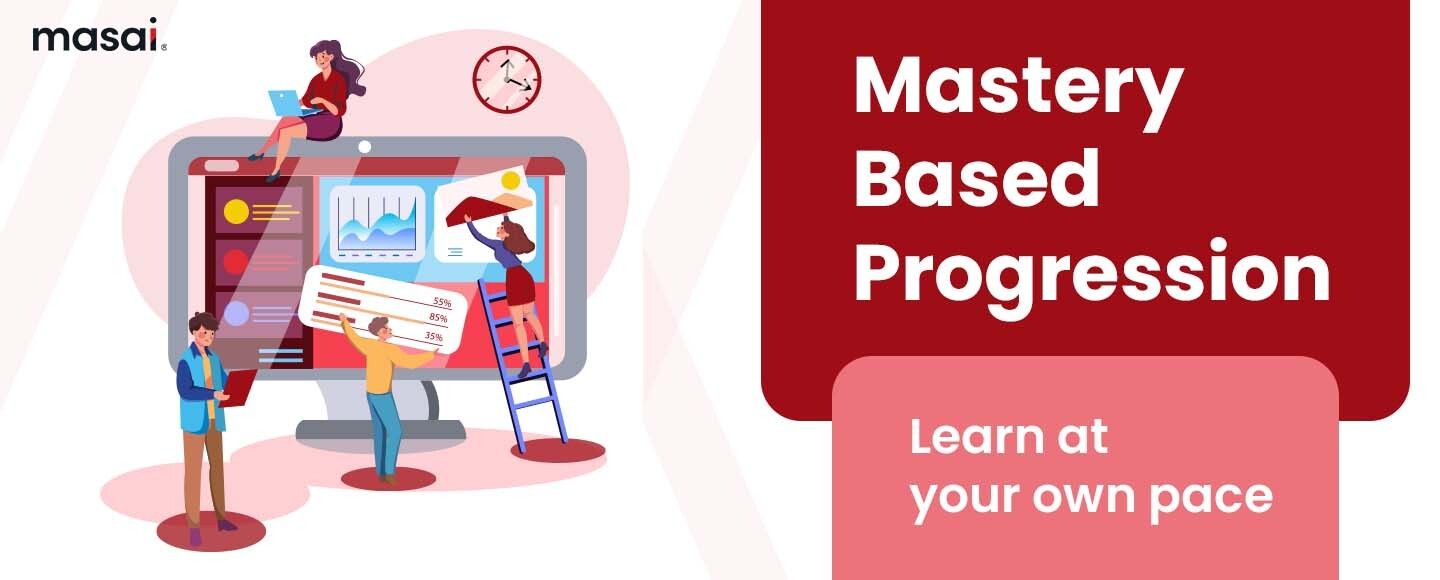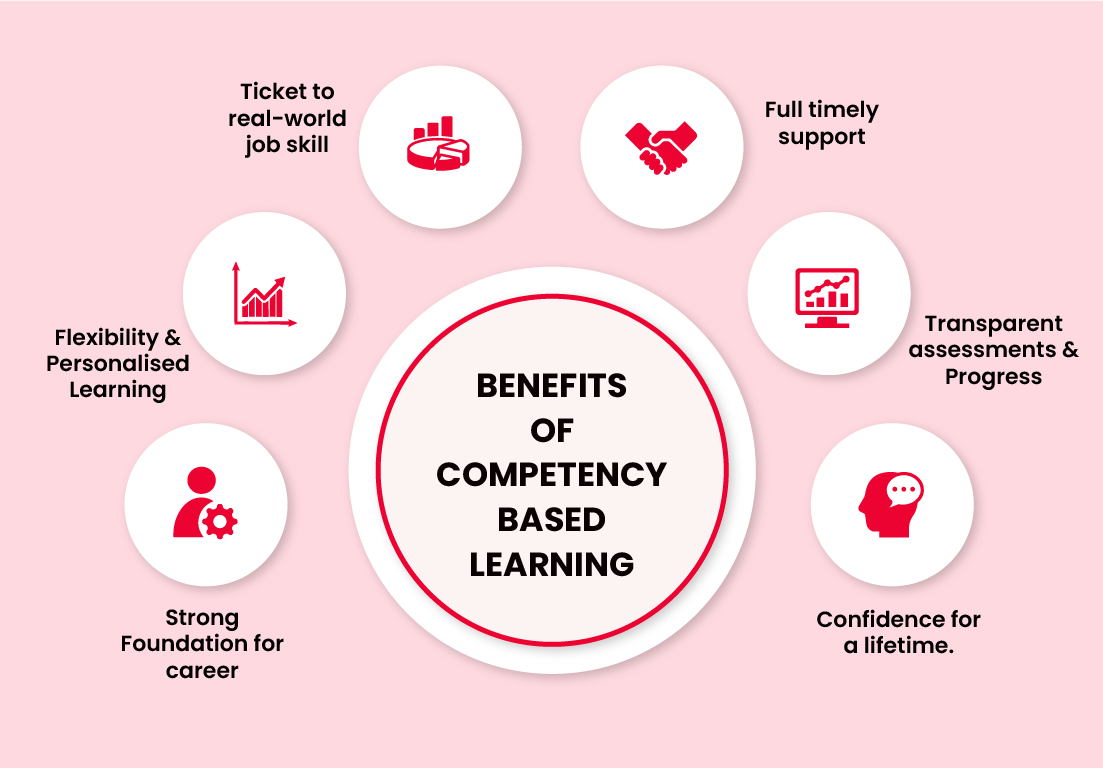Mastery-Based Progression - The Mantra for Students' Success at Masai
Competency-based learning is a system tailored to meet the needs of the students, to strike the hammer where it’s hot, rather than repeating the same template year after year.

Let’s observe a common situation.
Alexa is pursuing a software engineering course and is acing it at one subject, but struggles with another. With her exams approaching, she’s anxious about clearing the semester, therefore bringing about a change in her studying style.
Instead of focusing on ‘learning’, her focus moves to studying enough to pass the subject with minimum marks.
Bam! She’s into the next semester, and instead of things getting easier, she finds herself stuck in keeping up with the syllabus even though her fundamentals in just one subject aren’t clear.
With this trajectory of learning, we can assume that she’d forever be playing catch-up, and not be able to truly learn, and grasp the concepts. Her approach would completely shift from “Learning” to “Surviving”.
There are millions of students who experience the same thing across different streams. The mission is to score marks and not learn. Although they have high aspirations, most end up barely surviving, with little or no outcome.
As a result, when it’s D-day or Placement Day, many students don’t get placed, or end up getting jobs that aren’t that great.
But, what is the problem here?
Why do students fail at delivering outcomes?
Is it the student who lost interest? Or perhaps their learning style? Or maybe, the teacher couldn’t teach well?
Can we truly pinpoint the one at fault here? Perhaps, perhaps not!
What can be done to solve this problem? What is it that needs to be done to ensure that the student learns from the heart, and doesn’t just focus on getting bare minimum marks?
Enter – Mastery-Based Progression
In a nutshell, mastery-based learning works on the same lines as, say learning to play piano or a guitar. First, you need to master the basic notes, get experience with playing some basic tunes, and then only you can start making your own music. You can’t just start playing beethoven from the get go.
Mastery-based progression incorporates the same principle in education, where a student needs to conquer every little step on the ladder in their pursuit of mastery of the subject.
Let’s understand this in detail.
What is Mastery-Based Progression?
Mastery-based progression (MBP), also termed Competency-based learning, is a framework/structure for learning, assessment, evaluation, and progress for students based on their demonstrations of the skills they’ve learned and whether they’re able to apply them.
In MBP, a student doesn’t move forward until they’ve mastered a particular subject ensuring the proficiency and quality of education for students.
But how do we evaluate mastery?
In most cases, this evaluation is done on the basis of an assessment tool called a rubric.
Rubric – In education terminology, rubric means “a scoring guide used to assess and evaluate students’ progress. It is a set of criteria for grading assignments, projects, and the overall development of students in all components of work including communication, attitude towards learning, presentation skills, etc.
Rubrics contain the scoring guide along with the pointers to look at while scoring at different levels of achievement.
In case, a student doesn’t perform well on any of the mentioned metrics, they are not failed. Rather, the instructors address the shortcomings, and students are asked to repeat the module/subject with a different approach to ensure proper learning before moving forward.
Important update: Async is only applicable after the PAP signing i.e. from Unit 2 onwards. You don't get to repeat Unit 1.
MBP works on the belief that different people have different capabilities, and each of them learns at their own pace in their own way. It recognizes the different backgrounds students come from, their life & work experiences, language barriers, and learning styles among others.
Competency-based education aims at fulfilling that gap between education and employment by focussing on developing subject mastery and its application. More importantly, it focuses on flexibility and personalization for students.
Now, if you look closer, mastery is a relative subject. Thus, different institutes have different standards that define mastery.
Let’s look at how MBP works at Masai School.
How does MBP work at Masai School?
Witnessing students coming from all kinds of backgrounds and graduating with high-end placement packages is an everyday story at Masai.
What makes it possible?
MBP is the cornerstone for such structured learning that makes dreams come true at Masai. It ensures there are no gaps in the student’s employability quotient by the end of the program and our outstanding placement numbers at 97% stamps the case.
At Masai,
- In the MBP path, a student completes a project/assignment / sprint at the end of 4 weeks that covers Coding (Frontend & Backend engineering), DS & Algo, and Soft Skills learned during the preceding weeks.
- If a student clears the evaluation/ assessment / project / sprint during the monthly evaluation period, they advance to the next module.
- But if they can not clear the evaluation basis rubric parameter, we don’t just move them to the next sprint hoping they’ll master those concepts later. Instead, we reset the 4 weeks so they can start over again and spend more time with mentors, sherpas in order to internalize & master the concepts of programming.
- If someone is unable to clear the assessments at the end of a sprint except Module 1, they need to repeat the sprint as explained above and retake the assessment once again.
- However, if they do not clear the sprint in the second attempt either, we ask them to discontinue from the ongoing batch with an option to re-apply for the next upcoming batch.
Competency-based learning is a system tailored to meet the needs of the students, to strike the hammer where it’s hot, rather than repeating the same template year after year. At Masai, the team dissects the challenges faced by an individual and works on every little detail to craft students into industry-ready software engineers.
Factory-Based Learning vs Competency-Based Learning
The traditional model of learning, say factory-based education, has been around for a long time. Though it has produced results, most often these results are unequally distributed. It leaves a stark difference between two students belonging to the same batch just because every individual can’t adapt to the same learning pace and style.
Meanwhile, competency-based learning ensures that no student gets left behind, and makes progress only when they have mastered the concepts that they feared.
Also, in factory-based education, teachers/instructors lead learning in a way that is convenient to them and the students simply follow. However, In the case of MBP, there’s a deeper student-teacher relationship at work as the instructors consistently interact with individual students, find out the problem areas and facilitate learning at the level convenient to the individuals. (Flexibility & personalization as mentioned earlier)
Let’s look at a few other key differences between the widely functioning factory-based learning and the student-centered mastery-based progression:
| Factory-Based Learning (Time-based) | Mastery-Based Learning (Competence-based) |
| Students move forward with the class at a set pace. | Students advance only after demonstrating proficiency in the subject. |
| The focus is on scoring the passing marks by rote memorization. | Focus is on mastering every single concept from its roots before moving to the next topics. |
| If you fail, you need to repeat the whole year all over again. | The concept of failing doesn’t exist. Only the problem areas are addressed. |
| A student can advance upon scoring 75%. The rest 25% is not taken care of. | Scoring 75% means the student needs to learn the rest 25% to move ahead. |
| School dictates a fixed syllabus timeline which doesn’t change for any individual whether they’re able to follow or not. | Students unable to demonstrate mastered learning are given more time, space, and mentoring by the school. |
Student benefits of Competency-Based Learning
Needless to say, there are several benefits for students undergoing competency-based learning.
Here are a few of them:
- Competency-based learning is a goal-driven education model. It helps build a strong foundation for a student’s career by enabling them to become masters of the subject/domain.
- Students develop a higher interest in education through imaginative, step-by-step learning unlike in colleges where they keep drifting off the subject due to a templated learning model in place for everyone.

- Not having the fear of failure and further embarrassment brings positive energy to the students. Since, a guy with 90% and another guy with 70%, both will be evaluated using the same rubric and both of them will need to complete the rest 10% and 30% respectively before crossing to the next topic. As a result, we have students whose primary focus is to reach that 100% mark and achieve proficiency rather than competing with one another.
- With a shared goal towards mastery, students indulge in more peer-to-peer interaction without any sort of discrimination and envy against each other.
- Achieving absolute mastery in a subject also boosts students’ confidence and builds authority among others in the industry. This, in turn sets them up for a high-profile career with a solid network and credibility in the industry.
Future of Competency-Based Learning
Given the fast-paced development and the companies’ demand for highly-skilled workforce, competency based education can become a critical component in shaping the world’s future.
Think of it yourself. What can a group of 100 mastery based learners do if pitted against a group of 100 average students?
There will surely be a difference in the levels of their output, right?
Sal Khan, founder of the free online education platform known as the ‘Khan Academy’ and a keynote speaker at the Future of Education Technology Conference, brought to light the importance of mastery-based learning through his book – The one world Schoolhouse : Education Reimagined.
“The big idea in the book centers around letting every student learn at their own time and pace, having differentiation and requiring mastery of concepts before moving forward”
Based on similar philosophy, Masai school follows mastery-based progression by first listing down the concepts and skills required by the companies today and then assessing our students on all those parameters with proper feedback to make sure they’re ready to roll as software developers in the tech industry.
“Champions realise that defeat – and learning from it even more than from winning – is part of the path to mastery.”
Rasheed Ogunlaru
Aim for Mastery!

